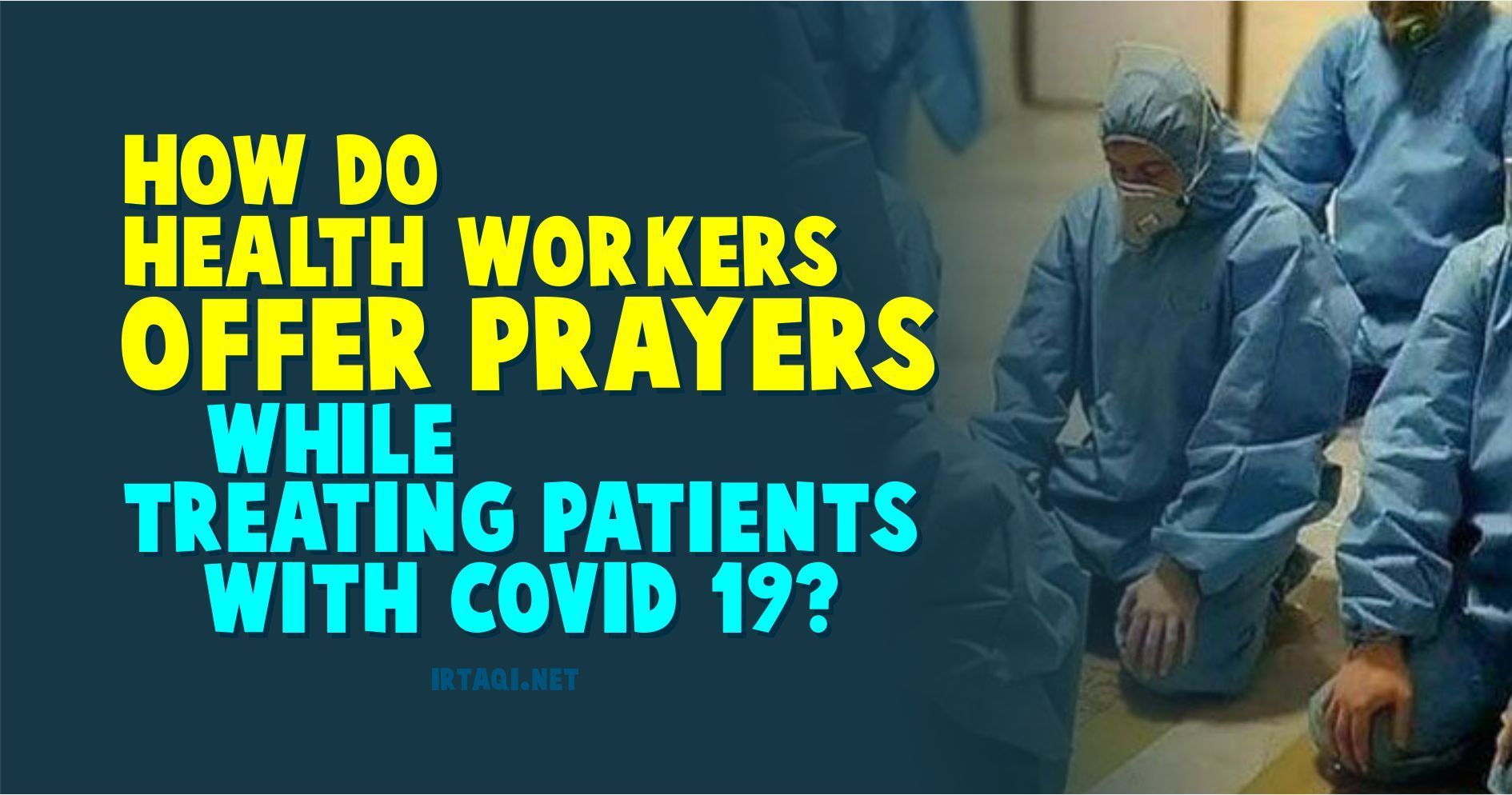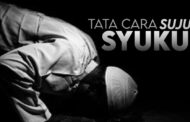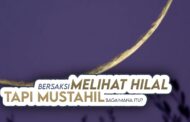Author: Muafa (Mokhamad Rohma Rozikin/M.R.Rozikin)
Doctors, nurses, midwives, and health workers, are currently facing a special problem when treating patients with Covid-19, namely “How to do ablution and prayers during the treatment?”
The answer is, normatively, they should perform both in the normal way as long as the situation allows them to do so without endangering their or other’s health or properties.
However, in the event of one is required to wear special clothing like hazardous material suit that is not easy or even impossible for him to take it off for one or more times of prayers, here are the solutions:
A health worker who cannot take off his clothes because of being assigned to treat patients with Covid-19, so he can do neither ablution nor tayamum when the time of prayer comes, then he is considered to have a legal excuse, similar to those who do not find water for ablution and do not find dust for tayamum. In this situation, he must immediately do the prayer when it’s time comes, without ablution and without tayamum.
The evidence for this provision is the following verse,
{ لَا يُكَلِّفُ اللَّهُ نَفْسًا إِلَّا وُسْعَهَا لَهَا مَا كَسَبَتْ وَعَلَيْهَا مَا اكْتَسَبَتْ } [البقرة: 286]
meaning
“Allah does not burden a soul beyond that it can bear” (Al-baqarah; 286)
In the verse above, God guarantees not to burden a soul beyond that it can bear. A health worker, when treating Coronavirus-infected patients, is unable to perform ablution and tayamum because taking the clothes off can endanger his and others’ lives and, moreover, cause great loss by throwing away a lot of disposable hazmat suits. In this situation, since his ability is only to pray without ablution and tayamum, he must pray even without ablution and without tayamum.
Another strengthening argument is the following verse,
{وَمَا جَعَلَ عَلَيْكُمْ فِي الدِّينِ مِنْ حَرَجٍ} [الحج: 78]
meaning,
“He has not placed upon you in the religion any difficulty. “ (Al-Hajj; 78)
Allah, in that verse, guarantees that there will not be difficulties in religion. Taking hazmat suit off, when treating patients with Covid-19, clearly leads to difficulties and even a danger to health, life, and property. Therefore, health workers do not need to do ablution and tayamum to perform prayers; Allah the Merciful does not want to make it difficult for His servants to worship Him.
Another corroborating proposition is the following hadith,
وَإِذَا أَمَرْتُكُمْ بِأَمْرٍ فَأْتُوا مِنْهُ مَا اسْتَطَعْتُمْ (صحيح البخاري (9/ 94)
meaning,
“And if I order you to do something, then do of it as much as you can” (H.R. Al-Bukhari)
In the hadith above, the Messenger of Allah ﷺ commanded that the Muslims carry out the religious orders as much as they could. Health workers who treat patients infected with the Coronavirus are only able to do prayers without ablution and tayamum when wearing hazmat suit. Therefore, it is obligatory for them to offer prayer this way, of which they are capable.
After performing the prayers while still wearing hazmat suits without ablution or tayamum, they do not need to repeat the prayers in another situation of which they are permitted to take off the suits and to do ablution normally. The argument is that the difficulty of taking off hazmat clothing is one of legal excuses that are rare and occur a long time (عذر نادر يدوم), similar to those suffering from الاستحاضة (abnormal uterine bleeding), inability to hold urine, continuous pre-ejaculation fluid discharge, continuous bleeding, uterine prolapse, having hadas (impurities) continuously and such, all of which are categorised rare conditions that occur for a long time. If they have offered prayers, then they do not need to repeat after recovered from these diseases. An-Nawawi said:
وَأَمَّا النَّادِرُ: فَقِسْمَانِ. قِسْمٌ يَدُومُ غَالِبًا، وَقِسْمٌ لَا يَدُومُ. فَمَا يَدُومُ يَمْنَعُ الْقَضَاءَ، كَالِاسْتِحَاضَةِ، وَسَلَسِ الْبَوْلِ، وَالْمَذْيِ، وَالْجُرْحِ السَّائِلِ، وَاسْتِرْخَاءِ الْمَقْعَدِ، وَدَوَامِ خُرُوجِ الْحَدَثِ، سَوَاءً كَانَ لَهُ بَدَلٌ، أَمْ لَا. (روضة الطالبين وعمدة المفتين (1/ 121)
Meaning,
“There are two kinds of rare legal excuses, namely those that are generally continuous and those that are not. The former kind does not require repetition, including الاستحاضة (abnormal uterine bleeding), inability to hold urine, continuous pre-ejaculation fluid discharge, continuous bleeding, uterine prolapse, and having hadas (impurities) continuously, without regard to any badal (substitute). ….” (Roudhotu Ath-Tholibin, vol. 1 p. 121)
If the Coronavirus outbreak is considered as “عذر نادر لا يدوم لا بدل معه” (rare excuse which does not last long without badal), then it means that after offering prayers without ablution or tayamum, health workers are obliged to repeat the prayers when they can take off their hazmat clothing and can wash normally. The obligation of repeating the prayers is based on the actual situation, in which the Coronavirus outbreak makes them unable to perform ablution and tayamum normally, is similar to that of those who cannot find water for ablution or dust for tayamum. An-Nawawi said,
وَمَا لَا يَدُومُ نَوْعَانِ. نَوْعٌ مَعَهُ بَدَلٌ، وَنَوْعٌ لَا بَدَلَ مَعَهُ، فَمَا لَا بَدَلَ مَعَهُ يُوجِبُ الْقَضَاءَ، وَذَلِكَ صُوَرٌ.مِنْهَا: مَنْ لَمْ يَجِدْ مَاءً، وَلَا تُرَابًا. وَفِيهِ أَقْوَالٌ. الْمَشْهُورُ: وُجُوبُ الصَّلَاةِ بِحَسَبِ حَالِهِ، وَوُجُوبُ الْقَضَاءِ. (روضة الطالبين وعمدة المفتين (1/ 121)
meaning
“There are two legal excuses that do not occur continuously, namely those accompanied by and those without badal (substitute). Excuses without badal require repetition. For example, in terms of those who do not find water or dust, there are several opinions, the strongest of which said that the prayer is still an obligatory, according to the situation, and so is its repetition.” (Roudhotu Ath-Tholibin, vol. 1 p. 121)
Health workers are not obliged to perform Friday prayer and are not obliged to pray in congregation, because Friday prayer obligation can be eliminated due to concerns about something that can cause dharar/danger to the soul and property or due to caring for the sick. Asy-Syirozi said,
ومنها أن يخاف ضرراً في نفسه أو ماله أو مرضاً يشق معه القصد والدليل عليه ما روى ابن عباس رضي الله عنه أن النبي صلى الله عليه وسلم قال “من سمع النداء فلم يجبه فلا صلاة له إلا من عذر” قالوا يا رسول الله وما العذر؟ قال: “خوف أو مرض” ومنها أن يكون قيماً بمريض يخاف ضياعه لأنه حفظ الآدمي أفضل من حفظ الجماعة ومنها أن يكون له قريب مريض يخاف موته لأنه يتألم عليه بذلك أكثر مما يتألم بذهاب المال. (المهذب في فقة الإمام الشافعي للشيرازي (1/ 178)
“Excuses for leaving Friday prayers and congregational prayers are, among others, worrying about the danger to themselves or to their properties or illness that makes them difficult to go to the mosque. The evidence is the hadith narrated by Ibn Abbas radhiallahu anhu that the Prophet ﷺ said, ‘Whoever hears the call to prayer then does not come to it, then there is no prayer for him, except for excuses’. The Companions asked, ‘O Messenger of Allah, what are the excuses?’ The Messenger answered, ‘Worried/scared or sick’. Another excuse is being a nurse for the sick and is concerned about neglecting the patient. The reason is that protecting human lives is more important than doing prayers in congregation. Another excuse is having a sick relative who he feared could die (if left). The reason is, the sadness he feels from losing relatives is more painful than losing properties.” (Al-Muhadzdzab, vol. 1 p. 178)
Health workers may do jam’us salah (doing two prayers at one time) because caring for the sick, like being sick, is a legal excuse. The sick and those who care for the sick are also no longer required offering Friday prayers. Thus, doing jam’us salah due to treating sick people or being sick is also permissible. An-Nawawi said,
قُلْتُ وَهَذَا الْوَجْهُ قَوِيٌّ جِدًّا ” المجموع شرح المهذب (4/ 383)
Meaning,
“I (An-Nawawi) said, ‘This opinion (which permits wrong hours for sick people) is very sound’” (Al-Majmu’ vol. 4 p. 383)
CONCLUSION
In situations like the Coronavirus outbreak, health workers who care for patients and cannot perform ablution or tawamum in normal way must offer prayers without ablution and without tayamum.
After doing the prayer, they
- do not need to repeat the prayer if the Coronavirus outbreak is seen as an excuse similar to الاستحاضة (abnormal uterine bleeding)
- should repeat the prayer if the outbreak is seen as an excuse similar to the condition of those who do not find water or dust for purification
Health workers who treat patients with Covid-19 may also do jam’us salah, because treating sick people includes legal excuse for it.
Wallahua’lam
Translated by Abu Ibrahim
Source






